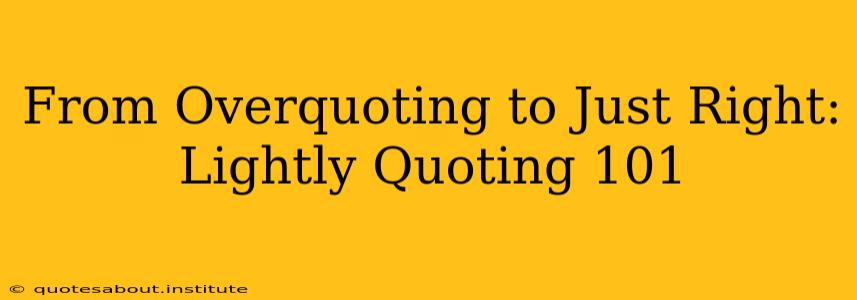Overquoting can sink your writing faster than a lead balloon. It disrupts the flow, bores the reader, and ultimately undermines your own voice. This guide will help you master the art of light quoting, ensuring your citations enhance, rather than detract from, your work. We'll explore the nuances of effective quotation usage and offer practical strategies to elevate your writing.
Why Is Overquoting a Problem?
Over-reliance on direct quotes often signals a lack of synthesis and critical analysis. Instead of demonstrating your understanding of the source material, it suggests you're merely regurgitating information. Readers crave your interpretation and insights; they don't want to wade through pages of uninterrupted quotations. Think of quotes as spices, not the main course. A pinch adds flavor, but a whole spoonful overwhelms the palate.
How Much Quoting Is Too Much?
There's no magic number, but a good rule of thumb is to quote only when absolutely necessary. Ask yourself:
- Does this quote offer unique phrasing or insight that I can't paraphrase effectively? If you can convey the same information in your own words, do so.
- Is the quote particularly impactful or memorable? Some quotes resonate with readers due to their eloquence or historical significance.
- Is the quote essential to supporting a specific argument or claim? If the quote provides irrefutable evidence, then its inclusion is justified.
If you find yourself quoting extensively, consider whether you've chosen the right sources or if you need to condense your argument.
Techniques for Light Quoting
Here are some strategies for reducing your reliance on long quotes:
- Paraphrase and Summarize: Rephrase the author's ideas in your own words, citing the source appropriately. This demonstrates your understanding and allows for a smoother reading experience.
- Use Partial Quotes: Instead of quoting an entire paragraph, focus on the most crucial phrases or sentences. Use ellipses (...) to indicate omitted words.
- Integrate Quotes Seamlessly: Don't just drop quotes into your text. Introduce them with context and smoothly transition into your own analysis. Use signal phrases like "According to X," or "As Y points out..."
- Focus on the Idea, Not the Wording: Sometimes, the core idea within a quote is more important than the exact phrasing. Focus on conveying the essence of the argument, even if you have to reword slightly.
What Are the Best Practices for Using Short Quotes?
Keep them concise and relevant. Avoid overly long quotes that interrupt the flow of your writing. Every quote should serve a purpose; it should support a point you're making or add weight to your analysis. Ensure that the quote adds value to your overall argument. Introduce the quote clearly, and follow up with your own analysis to explain its significance.
How Do I Know if I'm Overquoting?
Self-reflection is key. Read your work aloud. Do long stretches of quoted material disrupt the rhythm and flow? Does your own voice seem lost amidst the voices of others? If so, it's time to trim down on the quotes and let your own insights shine through. Consider asking a peer to read your work for feedback—a fresh perspective can be incredibly valuable.
What are some common mistakes to avoid when quoting?
One common mistake is omitting necessary context. Always introduce your quotes with relevant background information to ensure the reader understands their significance and purpose within your argument. Another mistake is misrepresenting the source material, either intentionally or unintentionally. Ensure your quotes accurately reflect the author's meaning. Finally, improper citation is a serious offense. Always cite your sources correctly and consistently, using a consistent citation style.
Conclusion: Strive for Balance
The ideal balance is a blend of your original ideas and thoughtfully selected quotes. By employing the strategies discussed above, you can elevate your writing from a sea of quotations to a clear, concise, and engaging piece of work. Remember, your voice and analysis are just as crucial as the insights of others. Let your own perspective shine through!

